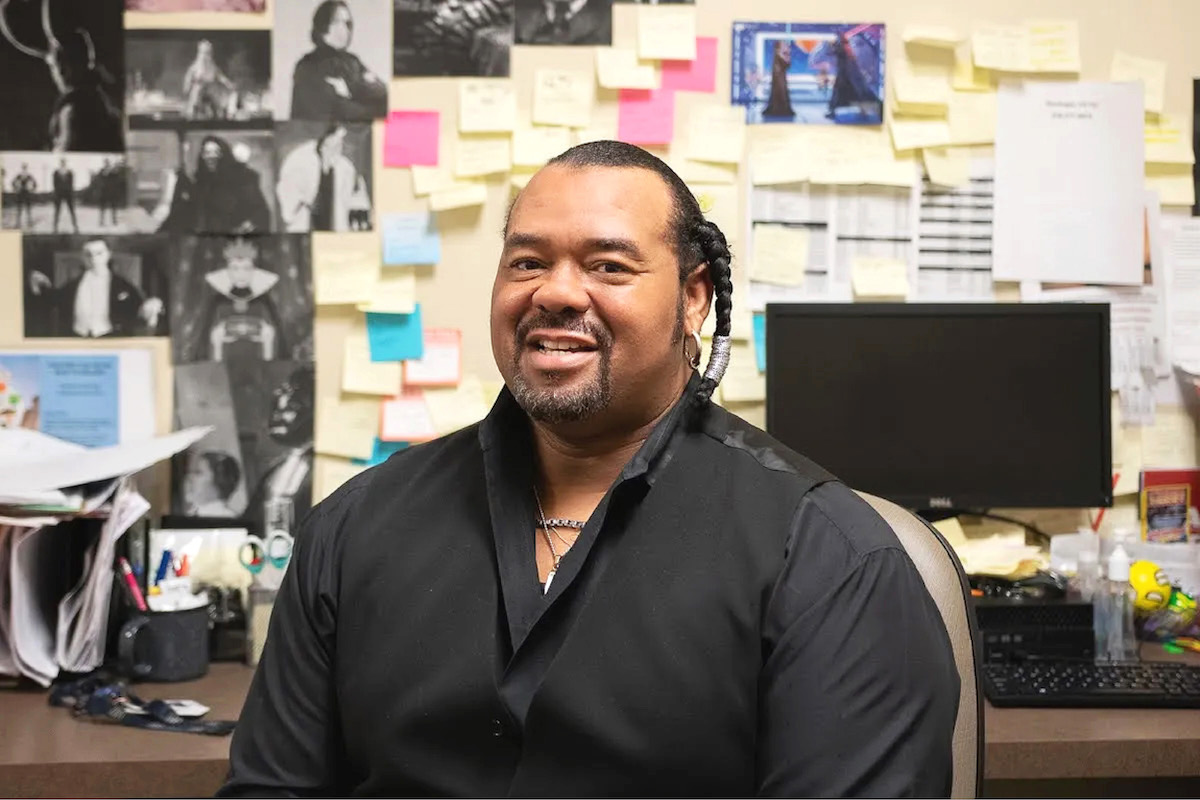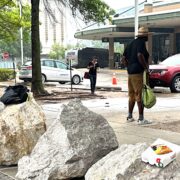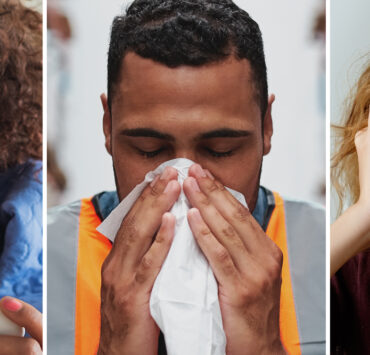
Abuse and fear filled Mongo Allen’s childhood. For years, he watched his father struggle with post-traumatic stress disorder and alcoholism. Allen and his brothers suffered the consequences. After his father recovered and opened up about his strife, Allen began teaching others how to heal.
In an Oklahoma Watch feature “A Mile In Another’s Shoes,” an initiative to give voice to the voiceless or call attention to the plight of those affected by public policy, Allen opens up about caring for Oklahomans who experience trauma, addiction and mental illness, and the tumultuous childhood that fuels his work. (Portions have been edited for brevity and clarity)
On Friday and Saturday nights, when we heard my father come home, we would rush to the piano and stand next to it in order — my older brother, then me, then my younger brother, like soldiers. We were 4, 5 and 6 years old and he’d make us stand by the piano and if we tried to sit down, he would whoop us. And whooping, that’s an easy word for it. We really did get beat. I mean, his whoopings would make people watching cry. It didn’t matter if we were tired or sleepy, he would make us stand there and we’d have to sing the songs on the radio. Stuff like Michael Jackson, it was Jackson Five. To this day I don’t know a single word of those songs. I think it’s just a trauma response, you know?
He didn’t know how to play, but he’d play the piano the entire time. For hours, this cat is playing and he’s doing some Liberace. … Brrrring, running his hands across the keys. Just pounding on the keys. And we would stand there and sing for hours.
It wasn’t until years later, when I was at Del Crest Junior High, that I started to understand him better. One day, my dad overheard my brothers and I talking and saying we hated him and he came right up to us and started yelling in our faces. He said all of that standing by the piano came because “I’d be out drinking and I’d be wanting to go to sleep, but every time I drank, I’d have nightmares about my best friend being shot in the head right next to me. And then my other best friend getting shot up.” And so what he would do is make us stay up and stand by that piano and sing so he didn’t have to fall asleep. He didn’t want to admit he needed help or know how to ask for it.
My father was drafted while he was in college. He was in the Army and he fought in Vietnam. And what he experienced over there messed him up. When he came home he started drinking and that contributed to the violence. But also, it had a lot to do with how he grew up. He got whooped, too. He didn’t know any better. But we’re breaking that cycle.
He was in and out of rehab three, four, five times, for years. But by God’s grace, he was healed. And then I started to see the changes. I remember, I was 12 years old and he actually said, ‘why don’t we get you to an art class because you’re so good at it?’ This was the same guy who used to throw my crayons away and rip up my pictures and tell me to stop doing that because art was for girls.
Art was my coping mechanism and I kept at it even when he hated it. I got my bachelor’s in graphic art from Southwestern Oklahoma State University and then got my master’s in education at the University of Central Oklahoma and took a job as an art teacher at an alternative high school in Oklahoma City called SeeWorth Academy. When kids got kicked out of their school, whether they were in Star Spencer, Midwest City or Enid, they would come to our school. We had a school full of people from all over Oklahoma in one building. And 75% of those kids were gang affiliated.
The first week I was there, there was a young man who was an incredible artist. He was drawing in front of me and I kind of took him under my wing. And so I worked with him for a few days and then he stopped showing up. Eventually, I asked, “Where’s that kid?” And they said he had been shot and killed in a store robbery. It just blew me away. And everybody went on with their business. Trauma had become a normal thing. The next week there was another kid involved in another act of violence and so I started writing their names down on a sheet of paper. And after a month that sheet of paper was filled front and back with kids who ended up dead or in jail.
Working with gangs, if you wore red, you were associated with the Bloods. If you wore blue, you were Crips. So every time you wore a color, the kids would associate you with a gang so I started wearing black on a regular basis. It just sort of became my thing and I still wear black to this day.
That school changed my life. I went into it just as a job, but after the first few weeks, it turned into something different. It turned into a passion for helping people with their issues.
I spent more than a decade there. Then I went to Cedar Ridge behavioral health hospital and worked in the kids unit with aggressive kids. I spent a lot of time creating a program that reduced the number of times they physically restrained the kids. And then I adapted that program for Griffin Memorial Hospital. I was on an adult unit that took overflow from Vinita where they hold patients who are considered criminally insane. These are generally the most violent and severely ill patients in the mental health system. Three shoulder surgeries and a back surgery later, I ended up here at Oakwood Springs.
I do this work to help people and I can do it because I thrive in chaos. I got used to dealing with the chaos of my father early on and it became comfortable. And in that comfort, I learned how to manage it.
Everybody should at least have an opportunity at stability, at healing and my classes teach people who struggle with addiction and mental health how to do that. I always start one of my classes with a 1978 video of Christopher Reeves as Superman saving Lois Lane. And then after that, I tell them, “Superman isn’t going to save you. If you want your life back, then you’ve got to be your own Superman.”
It took almost 14 years, with some mess ups and some bumps in the road, but my dad found his superhero cape. He became a minister when I was in high school and he started his own church while I was in college. My mom really got my dad where he needed to be in order to start healing and for probably the last 10 years of his life my dad and I became best friends. For the last 9 months, he was really sick. Every day I came to the hospital and I stood by his bed like I did that piano, only no one had to make me stand next to him. I did it with joy. I just stood next to him and held his hand and read Psalms and prayed for him. We had come full circle. The same man I stood by the piano with was now asking me to stand by his bed because he was scared and it gave him peace. I didn’t see that one coming.
Whitney Bryen is an investigative reporter at Oklahoma Watch covering vulnerable populations. Her recent investigations focus on mental health and substance abuse, domestic violence, nonprofits and nursing homes. Contact her at (405) 201-6057 or wbryen@oklahomawatch.org. Follow her on Twitter @SoonerReporter.









